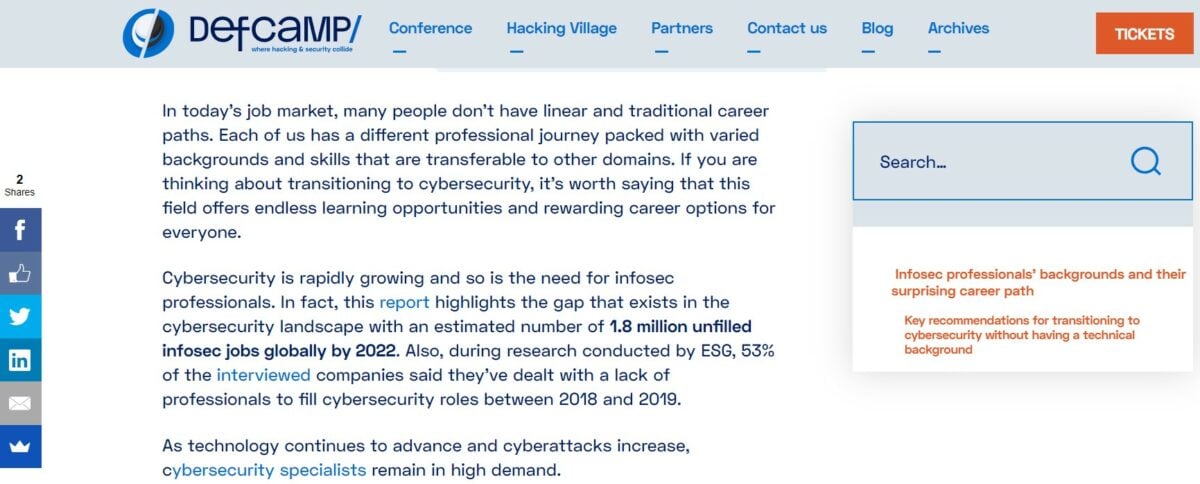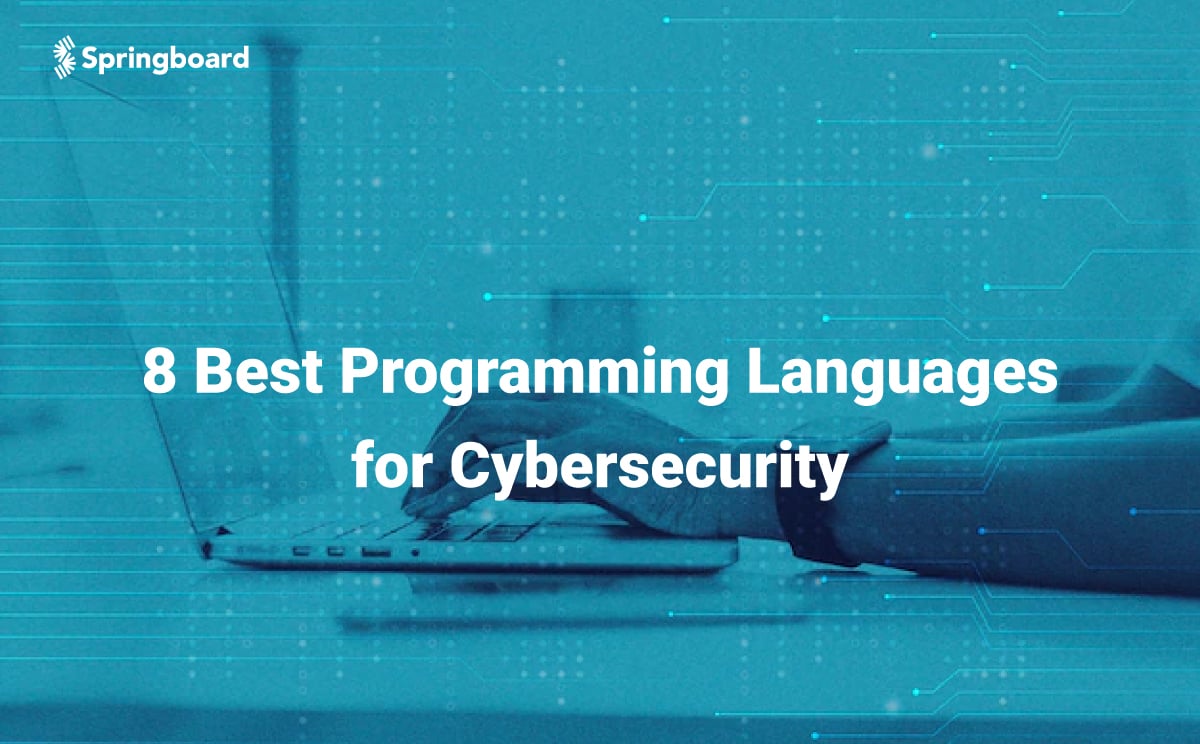Free Cybersecurity Course
Enter the cybersecurity field with our free introductory course. Learn the basics and build a strong foundation.
The need for skilled cybersecurity professionals will only continue to grow in 2024. The International Information System Security Certification Consortium’s 2023 Cybersecurity Workforce study has found that the gap between the requirement of cybersecurity professionals and the available workforce is growing at 12.6% year-over-year. The actual workforce in this area is growing only at 8.7%.
That’s good news for aspiring cybersecurity professionals. The availability of jobs will likely remain high relative to the supply of workers, and, what’s more, cybersecurity is an industry that you can crack without necessarily having a formal degree. In this post, we’ll look at how to land a cybersecurity job without following the conventional college path.
Is It Even Possible To Get a Cybersecurity Job Without a Degree?
Yes, it is possible to land a cybersecurity job without a degree. Companies have become open to hiring individuals based on the bootcamps and certifications that they’ve completed. Your portfolio of projects and open-source contributions also go a long way to help you stand out to recruiters.
This isn’t to say that you will have an easy time landing a job in cybersecurity without a degree. Often, a degree can be an easy path to getting a foot in the door. However, not having a degree doesn’t disqualify you from a career in cybersecurity. It is quite possible to land entry-level jobs in the field by proving your skills to recruiters using bootcamps, certifications, and portfolio projects.
Let’s now take a look at how you can go about picking up key cybersecurity skills without going to college and make yourself an attractive candidate in job interviews.
How To Get Into Cybersecurity Without a Degree
The lack of a degree is not an impediment anymore to getting a job in the cybersecurity industry. Aspiring cybersecurity professionals now have a whole range of learning paths at their disposal. Let’s take a look at some of these options in detail.
-
No Skills? Begin With an Online Course
-
Dedicate Time for Learning and Self-Education
-
Familiarize Yourself With Essential Cybersecurity Tools
-
Develop Core Cybersecurity Skills
-
Acquire Practical Experience
-
Networking: The Key to Unlocking Opportunities
-
Strategize Your Entry into the Cybersecurity World
No Skills? Begin With an Online Course
There are many different online options to consider as part of your cybersecurity learning journey.
Bootcamps
Bootcamps are perhaps the most thorough, dependable means to improve cybersecurity skills today. They promise the discipline of a college course without the same cost or time investment. You also get to learn in the company of your peers, which can make the process more fun and enriching.
Most cybersecurity bootcamps are taught by instructors who have industry experience. Much like in college, you go through a preplanned syllabus that covers all the important theoretical and practical bases in cybersecurity. But at the same time, bootcamps are a lot more affordable than a college degree, and they allow you to learn new skills at an easy pace.
Perhaps the most important reason to choose a bootcamp is how dynamic the course material tends to be. Colleges usually update their syllabi at a rate that is far slower than the rate at which the cybersecurity industry is developing. Bootcamps, on the other hand, regularly update their syllabi. For example, some have already integrated AI topics into their courses, enabling students to learn how the technology is used in advanced threat detection and predictive security systems.
You should also know that you can avail of plenty of handy perks if you choose the right cybersecurity bootcamp. The best ones provide you with mentors who will work with you one-on-one to address any queries that you have about what you’re learning or your career goals. There are also bootcamps that come with a job guarantee so that you can make a seamless transition from being a student to being a part of the workforce.
Certifications
Certifications are a great way to hone in on a niche within cybersecurity theory or learn how to use specific industry-standard tools. We’ve put together a list of some of the top cybersecurity certifications that are available to professionals in the industry here.
It is important to note that certifications are meant to add to an existing foundational understanding of cybersecurity. So you should consider getting certified only after you’ve gained basic skills in the field by completing a bootcamp or an introductory course.
The Self-Taught Path
While having an instructor or interactions with fellow learners is always nice, it’s also possible to learn cybersecurity independently. The biggest advantage of doing so is that you can curate your own learning resources — whether that’s books, courses, or personal projects. Being self-taught also means you get to move at the exact pace you’re comfortable with.
That said, the lack of accountability often means you must find ways to keep yourself disciplined on your learning journey. It can help to have an accountability partner or participate in forums where you can interact with others on the same journey as you.
Dedicate Time for Learning and Self-Education
Completing a cybersecurity bootcamp is just the beginning of your learning journey. Since cybersecurity is a field that’s evolving so quickly, you have to remain dedicated to picking up new skills in the area regardless of how much you’ve already learned or how experienced you’ve become.
There are a whole host of resources that you can rely on to keep evolving as a cybersecurity professional. As we’ve already mentioned, certifications are a great way to upskill yourself. We will also cover specific YouTube channels, courses, and books that you can use to keep abreast of developments in the industry in a subsequent section.
Familiarize Yourself With Essential Cybersecurity Tools
Cybersecurity professionals use various tools to help them complete specific tasks or to streamline their workflow. We’ve compiled a list of tools you should consider learning to use here.
The specific tools that you choose to pick up will depend on the context that you’re working within. If you’re already employed, your company will have an existing suite of tools, and you will have to learn how to use that set of tools.
Things are a little more open-ended if you haven’t found a job yet and are looking to learn how to use a tool so that you can enhance your overall skill set. In that case, you should focus on an area within cybersecurity that you’re interested in and pick a relevant tool. For example, if you’re interested in networks, you’d pick up a tool such as ZScaler or pFSense.
Another way to hone in on tools you should learn is by perusing job postings that have been put up online by companies you’re interested in. The job descriptions will often mention specific tools they require cybersecurity analysts to be familiar with. Learning to use these tools is an easy way to gain an edge over your competition when interviewing at those companies.
Develop Core Cybersecurity Skills
You will need to pick up a few skills regardless of the specific role you aspire to within cybersecurity. Let’s take a look at what they are.
Technical Skills
Network Security
Networks are a key area of focus within cybersecurity. Companies carry out most of their communication and operations using a variety of networked servers and computers. As a cybersecurity professional, you should be familiar with identifying different network types and being able to recommend security patches based on that.
Ethical Hacking
How do you know if your organization’s systems are safe from hackers? By trying to hack into them yourself. That’s exactly what the job of an ethical hacker is. This skill requires understanding things like port scanning tools, packet injection, wireless encryption, and social engineering.
Cryptography
Cryptographers are cybersecurity professionals who come up with methods to encrypt data. The goal is to keep sensitive assets from getting into the hands of hackers. Cryptography involves developing new encryption technology, familiarizing yourself with existing techniques like RSA, and training fellow employees to maintain data-safe practices.
Risk Assessment
Regardless of how hard you work on developing cybersecure systems, risk is always at play. Risk assessment is the process by which you identify shortcomings in your security systems and identify ways to minimize them. Risk assessment involves conducting security tests, producing mitigation reports, and proposing security system updates.
Soft Skills
Critical Thinking
Cybersecurity is a field that demands strong critical thinking skills. You should be able to analyze risks carefully, determine which actions need to be taken in what sequence, and think clearly at times when sensitive data might be compromised.
Communication Skills
Cybersecurity professionals often spend time educating their colleagues on various aspects of security. This requires strong communication skills. You should be able to describe risks in layman’s terms and develop practices that are easy for members of your organization to assimilate into their routine.
Stay Updated with Industry Trends
Developing the practice of reading up on cybersecurity news is beneficial to anyone working in the industry. There are regular developments regarding new kinds of threats and technologies that are being used to stay ahead of malicious elements. Staying abreast of these developments is a part of your growth as a cybersecurity professional.
Acquire Practical Experience
There’s only so much you can achieve by reading books and focusing on theory. Eventually, you need to get your hands dirty on cybersecurity projects. Here are a few ways that you can get that done.
Contribute To Open-Source Security Projects
Open-source projects are a great way to ease into the world of cybersecurity analysis. They allow you to peruse project code and find small ways to help improve it using the skills you have at your disposal. You can look at this guide to find out how to start contributing to open-source projects.
Consider Freelancing in Cybersecurity
Freelancing in cybersecurity allows you to work on various projects and customize your engagement with each client. The key here is to pick projects that will help you elevate your profile in the specific areas you want to work in long term.
Remember that freelancing becomes a lot easier when you’ve already gained some experience working in cybersecurity. So you should at least complete an internship before considering freelancing. If you’re still not fully sure about your skills, you can request that you work under the guidance of a more experienced cybersecurity professional.
Seek Mentorship in the Field
Mentors allow you to learn from their experience and get tailored advice on how you can advance your career in cybersecurity. Finding mentorship is a step that every cybersecurity professional should take regardless of their specific goals or experience in the industry. There’s always someone more experienced than you from whom you can learn.
The key to finding a mentor is to make the engagement as low-effort for them as possible. You can approach potential mentors within your organization or on sites like LinkedIn for a start. Make sure to make a structured mentorship request, meaning there’s clarity on what you’re looking for, how much time you’re asking for, and the specific areas you need help with.
Networking: The Key to Unlocking Opportunities
Those who know how to network can go much further than their peers in a much quicker time. Landing jobs and gaining access to certain roles becomes much easier when you know the right people. Here are a few ways to ease into the practice of networking.
Join Cybersecurity Forums and Groups
There are many cybersecurity communities online. They range from those catering to all professionals in the industry to those meant for people who work in specific areas or on certain technologies.
Here are a few cybersecurity groups online to get you started.
Attend Industry Conferences and Webinars
Conferences are opportunities to meet fellow cybersecurity enthusiasts face-to-face. These events often have mixers and other opportunities to interact with people from the community.
Webinars are also a great way to meet others excited to improve their cybersecurity skills. Some webinars allow you to join private groups, which is an opportunity you should take full advantage of.
Strategize Your Entry into the Cybersecurity World
If you’re going to land that dream cybersecurity job, you need a plan. Let’s now focus on some steps you can take to improve your chances of landing an entry-level role in cybersecurity.
Look for Internships or Entry-Level Positions
You will only find what you are looking for. So if you want to break into the industry, you must start searching for internships or entry-level jobs in your area in cybersecurity.
Websites like Indeed, LinkedIn, and Glassdoor are a good place to begin your search. They make it extremely easy to filter jobs based on niche and location. You can also expand your search using cybersecurity job boards like:
Prepare for Cybersecurity Interviews
Acing the interview is something you can do easily, given that you put in the work. Of course, you must have all the right technical and soft skills. But along with that, you should also know what you need to do to come across as a viable candidate in an interview.
To make that happen, you can start by practicing some of the most common questions that come up in cybersecurity interviews. Make sure to do mock interviews as part of your practice. This will allow you to work on delivering your answers in an effective manner.
To take things a step further, you can record your interviews on video. You can review these recordings to ensure you always project calm, confident body language.
Customize Your Resume for Cybersecurity Roles
Your resume is the first opportunity you have to create an impression on a potential employer. In such a situation, you don’t want to waste time conveying how you’re a great fit for a particular role.
To that end, always tailor your resume based on the job you’re applying to. Start by reading the job description so that you know exactly what the company is looking for. Based on that, mention skills, technologies, and past experiences that are most relevant to those requirements.
Explore Related Roles in IT and Security
Now it is possible that you do all of the aforementioned things and still don’t land your dream cybersecurity job when you expected to. Not to worry, there are still other ways that you can get to your goal, albeit perhaps on a slightly different schedule.
An effective option at this juncture is to find a job that is tangentially related to the job that you aspire to in cybersecurity. Roles in areas like systems analysis, network engineering, and information systems all involve skills that are somewhat related to tasks that you would work on as a cybersecurity analyst. Consider working in those roles before returning to your job hunt in cybersecurity.
At the same time, make sure that you’re always improving yourself as a cybersecurity professional. That means continually working on your skills, completing certifications, and working on your portfolio. Doing so will ensure that you build a profile that recruiters will see merit in when you apply to a cybersecurity role.
Examples To Follow
Charting a career in cybersecurity can seem like an arduous undertaking. If you’re feeling a little bogged down, you can turn to people who’ve already achieved similar goals for inspiration. Here are a few such examples.
Boyd Clewis
Today, Boyd Clewis is a well-known cybersecurity expert who has worked with some of the top companies in the world. But he’s made it to this point after teaching himself cybersecurity skills while working a help desk job. The linked video is full of valuable insights for anyone wondering if they can make it in the big, bad world of cybersecurity while being self-taught.
Cybersecurity Career from a Non-technical Background

If you come from a non-technical background, you might have your misgivings about aspiring to a career in cybersecurity. But the truth is that you can make a career in this field even if you come from an unrelated background. The linked post features the stories of cybersecurity professionals who come from backgrounds such as graphic design, healthcare, and finance.
Still Not Sure? Where To Start
We’ve covered a lot of ground regarding information on how to build a career in cybersecurity without having a relevant degree. But it’s possible that you still feel like you need to do some more research and read up on the industry further. Here’s a list of resources that you can use to learn more about cybersecurity.
Online Courses
- Cybersecurity for Everyone
- Introduction to Cybersecurity Tools & Cyber Attacks
- Cyber Security: From Beginner to Expert
YouTube Channels
Websites and Forums
Blogs and News Outlets
Books
- Metasploit: The Penetration Tester’s Guide
- Practical Malware Analysis: The Hands-On Guide to Dissecting Malicious Software
- The Web Application Hacker’s Handbook: Finding and Exploiting Security Flaws
Cybersecurity Experts on Social Media
Get To Know Other Cybersecurity Students
Rafael Ayala
Mergers And Acquisitions at Autodesk
Vianey Luna
IT Security Specialist at Cooper Machinery Services
Jose Mendoza
Cyber Security Career Track Student at Springboard
FAQs About Getting Into Cybersecurity
Do I Need a Formal Degree To Work in Cybersecurity?
No, you don’t necessarily need a formal degree to work in cybersecurity. You can acquire the requisite skills by completing bootcamps, certifications, and online courses. It’s also important to keep up with developments in the field by following cybersecurity blogs and news outlets.
Your ability to land a job is determined by how well you prepare for the interview process. Make sure you tailor your resume based on the job you’re applying to. Also, practice common cybersecurity interview questions and focus on communicating clearly during the interview.
Which Certifications Are Most Recognized in the Cybersecurity Industry?
The following are some of the most popular certifications in the cybersecurity industry:
Certified Information Security Manager (CISM)
CompTIA Security+
Certified Ethical Hacker (CEH)
Certified Information Systems Security Professional (CISSP)
A whole host of other certifications are recognized in the cybersecurity industry. You should pick a certification to complete at any juncture based on the specific skills that you want to acquire. This could be based on areas that you’re personally passionate about or technologies that you need to learn so that you can land a specific kind of role.
How Can I Gain Practical Experience in Cybersecurity Without a Job in the Field?
Internships are an obvious choice when it comes to acquiring real-world experience. Most job sites out there will carry postings for cybersecurity internships. Completing a cybersecurity bootcamp or having a portfolio of personal projects can help you land internships.
Contributing to open-source projects is another important avenue to gain hands-on experience. Such projects are great for beginners because they allow you to see how professionals mount large projects and build code bases. You can then hone in on a specific aspect of the project and contribute to it.
Finally, volunteering can also provide you with much-needed real-world experience. There are always non-profit organizations and small businesses that could use help with securing their IT systems. Reach out to such organizations in your area to see if they’re willing to take you on as a volunteer.
Is Networking Important in the Cybersecurity Industry?
Networking is a key area of focus in cybersecurity. This is because all information exchanged within an organization and with third parties occurs through networks. Any breach in a network can expose vast troves of sensitive information. It’s essential for every cybersecurity professional to have a working understanding of network security for that reason.
How Long Does It Take To Become Proficient in Cybersecurity Without a Degree?
The time it takes you to become proficient in cybersecurity will depend on your existing skills.
It’s possible that you already have a background in technology. Let’s say that you’ve worked as a systems analyst or network engineer. These are skills that transfer well to cybersecurity, and you can pick up basic job-specific skills in a matter of two to three months.
But let’s say you’re a complete beginner in technology. In that case, you will have to start right from basic skills like writing beginner programs and work your way up to working on areas that pertain to cybersecurity. If that’s where you are, give yourself at least a year to become proficient at the job.
Since you’re here…
There are hundreds of thousands of vacant cybersecurity jobs, and one of them has your name on it. You can enter the industry in 6 months flat with our Cybersecurity Course. We’ve helped over 10,000 students make huge career changes with our fully flexible mentor-led bootcamps. Explore our free cybersecurity course curriculum today to start your career switch story.







